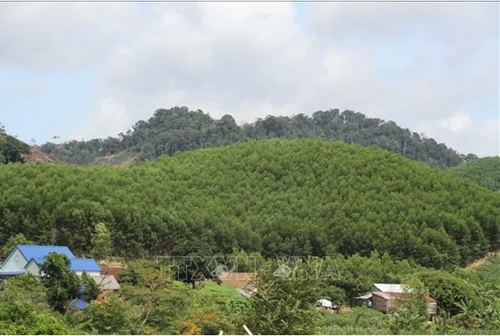The work is to reduce greenhouse gas emissions at a reasonable cost, and to promote low-emission technologies, contributing to raising the competitiveness of businesses and the income of people participating in emission reduction and forest projects, the leader said in the document on strengthening carbon credit management to implement the Nationally Determined Contribution (NDC), adding that to fulfill its commitments to cutting emissions to net zero by 2050 announced at the 26th U.N. Climate Change Conference (COP 26), Vietnam has updated the NDC and materialized other relevant international commitments.
    |
 |
|
Since the mid-2000s, many businesses have rolled out carbon credit programs and projects. |
In Vietnam, since the mid-2000s, many businesses have rolled out carbon credit programs and projects, notably those under the Clean Development Mechanism (CDM).
However, many organizations, enterprises and individuals have yet to be fully aware of the carbon market and how to create carbon credits to be traded in the market, according to the directive.
Carbon credit management covers the development and implementation of regulations on mechanisms for managing the creation, exchange and trading of carbon credits on a voluntary basis or offset against gas emission quotas. It also serves as the foundation for the domestic carbon market to grow and integrate into the world.
The Prime Minister noted that the exchange and trading of carbon credits and the outcomes of greenhouse gas emission reduction need to support the country’s emission target and ensure the harmony of the interests of the State, people, businesses and other stakeholders.
To that end, he assigned specific tasks to the Ministries of Industry and Trade; Transport; Construction; Agriculture and Rural Development; and Natural Resources and Environment, which will issue and put in place greenhouse gas emission mitigation plans in the third quarter of this year.
They will also coordinate with other relevant agencies to provide consultations for competent authorities in the negotiation, signing and implementation of agreements or contracts on carbon credit transfer with international partners, and in assessing the readiness of some sectors for joining the carbon market.
The Ministry of Natural Resources and Environment is to quickly work on the establishment of a national registration system for carbon credits, and manage programs, projects, and activities to reduce greenhouse gas emissions and create carbon credits for the pilot run of the domestic carbon market and for exchange with international partners.
It will also coordinate with the Ministry of Natural Resources and Environment, other agencies and localities to build a database on the current status of forests and their potential for emission reduction and carbon absorption by 2030 and with a vision towards 2050. The potential assessment should be completed by October 31, 2024.
Meanwhile, the Ministry of Industry and Trade is assigned to review the legal basis, domestic situation and international experience in the management, trading and exchange of the Renewable Energy Certificate (REC) associated with the materialization of the national emission goal, and propose management regulations (if any). A report on the work must be submitted to the Prime Minister before September 30.
The Ministry of Finance will play a key role in perfecting the project on domestic carbon market development, and submitting it to competent authorities for approval, and studying regional and international experience in building, managing, operating and developing carbon markets.
The Prime Minister also called on localities to join efforts in this regard through specific measures.
Source: VNA